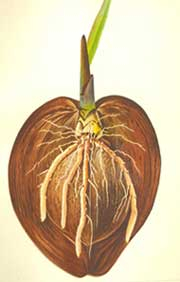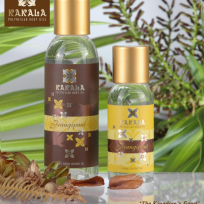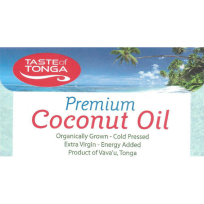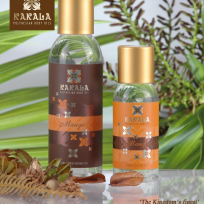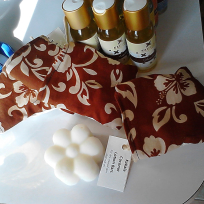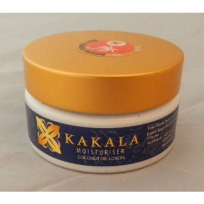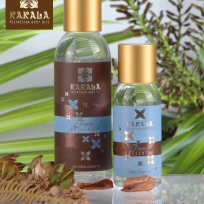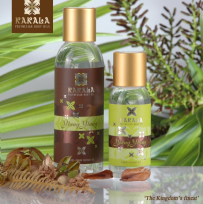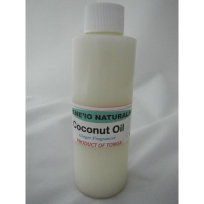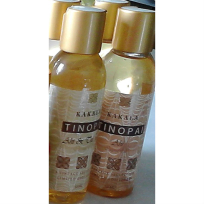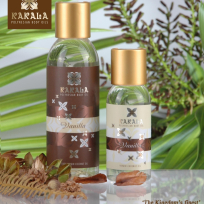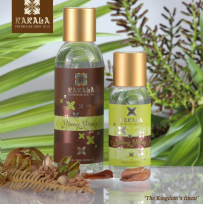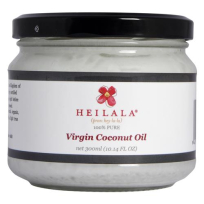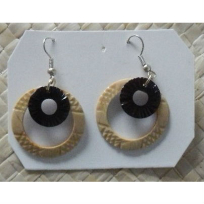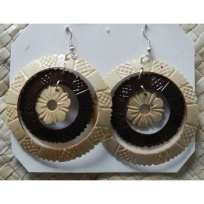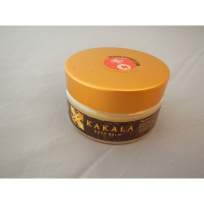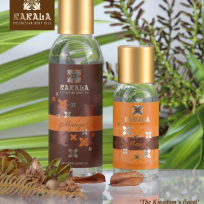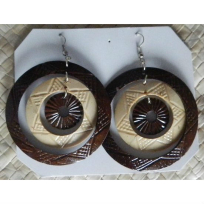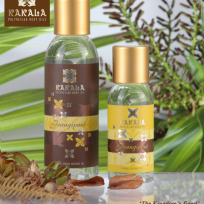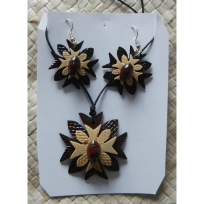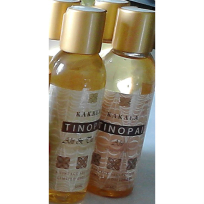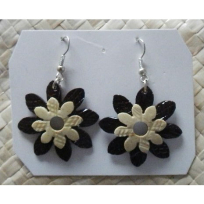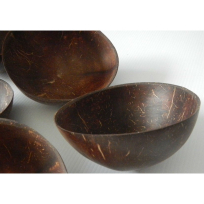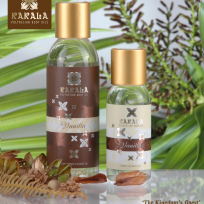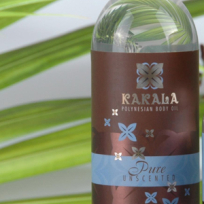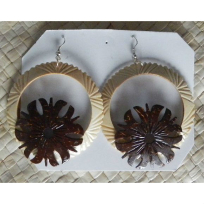Products
Shop Online
Shopping Cart

Shop Online
Coconut
Coconuts are so versatile you will find them being used in Tonga, like other South Pacific nations, in many different ways. The oil is used in cosmetics and in traditional cooking. The water is a refreshing drink and high in nutrients and electrolytes. Fibre from the husk is made into mats, mattresses and ropes and the shells are used as bowls and cups. The leaves are woven into baskets, hats and mats whilst the wood from the trunks is made into furniture.
Coconut oil is a healthy option that can be easily incorporated into your daily diet, it is predominantly healthy medium chain fatty acids including 50% lauric acid which supports weight management, healthy cholesterol & energy levels:
Other uses for coconut oil include;
- Skin Moisturiser
- Reversing Skin Tissue Damage
- Treating Wounds
- Hair Treatment
- An Erotic Oil
- Meditation and Essential Oils
- Alternative to other vegetable oils in cooking or baking
- Substitute butter or margarine as a delicious spread
- Add to various recipes for a sensational flavour
Read More
Weight Loss
Coconut oil is nature’s richest source of medium chain fatty acids, or medium chain triglycerides (MCTs for short). MCT's increase metabolic rates and lead to weight loss. MCTs promote what is called thermogenesis. Thermogenesis increases the body’s metabolism, producing energy.
Another benefit of coconut oil consumption is it helps control blood sugar levels. The medium-chain fats in coconut oil are similar to fats in mother’s milk and have similar nutriceutical effects. These health effects were recognised centuries ago in Ayurvedic medicine. Modern research has now found a common link between these two natural health products - "their fat or lipid content". The medium chain fatty acids and monoglycerides found primarily in coconut oil and mother’s milk have miraculous healing power. Outside of a human mother’s breast milk, coconut oil is nature’s most abundant source of lauric acid and medium chain fatty acids.
Skin Moisturiser
Coconut oil has been used as a skin moisturiser for thousands of years. It is ideal for dry, rough and wrinkled skin and excellent in helping to treat eczema and psoriasis. Since eczema and psoriasis are both characterised by inflammation, the anti-inflammatory properties of coconut oil make this a perfect treatment option. The fact that coconut oil results in absolutely no side effects makes this an even more attractive option.
Its high content of Medium Chain Fatty Acids (MCFA’s) makes it easily absorbed by the skin. It prevents stretch marks and lightens existing ones. Its antiseptic elements keep the skin young and healthy and relatively free from infections. All of these benefits also make coconut oil ideal for massage and massage therapists.
Coconut oil as a skin moisturiser also has a pleasant odour and provides a beautiful radiance to the skin.
Skin Repair
Free radicals are oxygen molecules that have become unstable and reactive. They bounce around cells and tissues depleting healthy molecules and causing damage, this has come to be regarded as the primary cause of aging. The damage often becomes visible on our skin as wrinkles, blemishes, age spots, liver spots and lingering scars.
Polyunsaturated oils, which are all commercial vegetable oils, soy products and margarine are often already rancid and toxic as a result of the use of chemicals and heat in their production process. Other oils such as flax, olive, hemp, nut and seed oils and so on, are light to moderately stable. They are therefore extremely heat and light sensitive and can become oxidised, rancid and even toxic when left exposed to light and/or heat. When oxidative damage or rancidity occurs to the oil it becomes sticky and difficult to wash off. Once inside the body this characteristic of oxidised or damaged oil has a similar affect leading to free radical damage.
Nourishing and repairing the skin with coconut oil, is approached by using the oil both internally and externally. Coconut oil reverses the tissue damaging process by displacing the cooked oil from the tissues and providing fat-soluble vitamins, minerals, and super nutrition factors directly to the damaged tissues.
Treating Wounds
Coconut oil on its own or as a carrier for essential oils is a great way to treat skin wounds topically. Mixed with Tee Tree oil it has powerful antiseptic, antimicrobial and antifungal affects that may help treat fungus overgrowth, open cuts and sores, rashes or skin irritations such as psoriasis eczema and athlete’s foot.
Coconut Oil For Eczema
Coconut oil is easily one of the most effective natural treatments for eczema. Because coconut oil contains antibacterial and antioxidant elements that help soothe the itching of the skin, as well as reduce inflammation caused by the eczema. Coconut oil contains tons of vitamins that can help nourish the skin and decrease the itching caused by eczema. Because coconut oil is natural, it does not contain any harsh chemicals and other ingredients that may even cause the symptoms of eczema to become more severe. Simply apply coconut oil for eczema around four times a day and apply some as you go to bed as well.
You can either ingest the coconut oil and have it work internally. Or you can apply it directly to the affected skin. By taking coconut oil internally, you will help give your body essential vitamins and fats in order to maintain a healthy immune system. A healthy immune system will help your body fight infection and reduce inflammation. By applying the coconut oil directly to the affected skin, you will give your skin essential vitamins, and fats it needs to maintain healthy collagen levels and will soothe the skin.
Hair Care
Polynesian women often attribute their long, silky, shiny and rich looking hair to the regular use of coconut oil as a hair moisturising treatment. Coconut oil offers moisture and hair nourishment that unlike many commercially produced products is pure and nutrient rich. Simply massage the oil through your hair and leave it in as a treatment for 2 or more hours and wash it out. You can also do this before bed and leave it in over night. Each hair type may have different moisture requirements, so it is best that you determine for your self how often your hair needs a treatment.
As an Erotic Oil
That’s right coconut oil is also used as an erotic oil. Some say you should have one jar in the kitchen, one in the bathroom and one in the bedroom.
The smell and taste of the oil enhance sexual intercourse. It’s antiviral, antimicrobial, and antifungal properties can offer some protection from sexually transmitted disease, not complete though so it is best to use condoms and other appropriate protection when necessary. Coconut oil should be used with polyurethane condoms or a natural skin condom. Latex condoms are best avoided because coconut oil can dissolve the latex.
Meditation and Essential Oils
Because of its beautiful aroma and calming nature coconut oil is excellent to use as a lotion or massage balm to relax and calm your mind. To help obtain mental clarity and focus simply massage some oil across your forehead and temples. Mixed with lavender, sandalwood or frankincense it also enhances the therapeutic qualities of these essential oils. Mixed with rose oil it also makes a lovely natural and uplifting perfume.
Oil Pulling
Oil Pulling is a very simple and effective way to detox your body that also cleans and treats your teeth and gums. It is an age old ancient Ayurvedic healing tradition that has been around for hundreds of years.
Benefits of oil pulling include
- brighter whiter teeth
- healthier gums
- increased energy
- clearer mind
- decreased headaches
- better skin
- alleviated allergies
- clearer sinuses
- fresher breath
The process is most effective when done first thing in the morning on an empty stomach. You simply put a tablespoon of coconut oil inside your mouth and swish it around for 10-15 minutes and then spit it out and rinse or wash your mouth and teeth clean. The enzymes in the fat literally ‘pull’ toxins, pus and mucus from inside your body’s cells, blood and gut. The antibacterial properties of coconut oil can help with clearing gum disease and tooth infection. It is known to also improve digestion because of its detoxifying effects on the gut.
...More About Coconuts
Found throughout the tropic and subtropic area, the coconut is known for its great versatility as seen in the many domestic, commercial, and industrial uses of its different parts. Coconuts are part of the daily diets of many people. Coconuts are different from any other fruits because they contain a large quantity of "water" and when immature they are known as tender-nuts or jelly-nuts and may be harvested for drinking. When mature, they still contain some water and can be used as seednuts or processed to give oil from the kernel, charcoal from the hard shell and coir from the fibrous husk. The endosperm is initially in its nuclear phase suspended within the coconut water. As development continues, cellular layers of endosperm deposit along the walls of the coconut, becoming the edible coconut "flesh".When dried, the coconut flesh is called copra.
The oil and milk derived from it are commonly used in cooking and frying; coconut oil is also widely used in soaps and cosmetics The clear liquid coconut water within is a refreshing drink. The husks and leaves can be used as material to make a variety of products for furnishing and decorating. Coconut also has cultural and religious significance in many societies that use it.
The Coconut tree, Cocos nucifera, is a large palm, growing up to 30 m (98 ft) tall, with pinnate leaves 4–6 m (13–20 ft) long, and pinnae 60–90 cm long; old leaves break away cleanly, leaving the trunk smooth. Coconuts are generally classified into two general types: tall and dwarf.[6] On very fertile land, a tall coconut palm tree can yield up to 75 fruits per year, but more often yields less than 30, mainly due to poor cultural practices. In recent years, improvements in cultivation practices and breeding have produced coconut trees that can yield more fruit.
Botanically, the coconut fruit is a drupe, not a true nut. Like other fruits, it has three layers: the exocarp, mesocarp, and endocarp. The exocarp and mesocarp make up the "husk" of the coconut. Coconuts sold in the shops of nontropical countries often have had the exocarp (outermost layer) removed. The mesocarp is composed of a fiber, called coir ( the natural fibre extracted from the husk of coconut and used in products such as floor mats, doormats, brushes, mattresses), which has many traditional and commercial uses. The shell has three germination pores (stoma) or "eyes" that are clearly visible on its outside surface once the husk is removed.
A full-sized coconut weighs about 1.44 kg (3.2 lb). It takes around 6,000 full-grown coconuts to produce a tonne of copra.
Interesting Coconut Trivia Facts
- Every bit of the coconut is used. As a result, coconuts are called the “Tree of Life” and can produce drink, fiber, food, fuel, utensils, musical instruments, and much more.
- When intra-venous (IV) solution was in short supply, doctors during World War II and Vietnam used coconut water in substitution of IV solutions.
- Botanically, the coconut palm is not a tree since there is no bark, no branches, or secondary growth. A coconut palm is a woody perennial monocotyledon with the trunk being the stem.
- It takes 11 -12 months for the coconut to mature. The trees can live for over a hundred years and can produce 50-80 fruits per year.
- At one time scientists identified over 60 species of Cocos palm. Today, the coconut is a monotypic with one species, nucifera. However, there are over 80 varieties of coconut palms, which are defined by characteristics such as dwarf and tall.
- Virgin Coconut Oil can only be achieved by using fresh coconut meat or what is called non-copra. Chemicals and high heating are not used in further refining, since the natural, pure coconut oil is very stable with a shelf life of several years.




